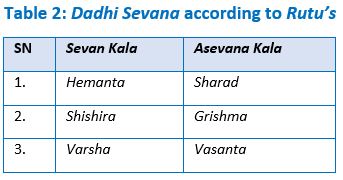A case control study on Asheelaneeya Dravya Dadhi and its role as Nidana of Mukhapaka with special reference to Karya Karana Siddhanta
DOI:
https://doi.org/10.21760/jaims.8.8.4Keywords:
Asheelaniya, Dadhi, Mukhapaka, Karya, Karana, Siddhanta, AyurvedaAbstract
Many things in the universe including the creation itself happens due to the “cause and effect" relationship is called Karya Karana Siddhanta. Ayurveda is a science which cures the disease, it also helps in the prevention of diseases. According to our Acharya's 'Dadhi ' (curd) is Asheelaneeya Dravya. Dadhi is most common food content of Indian diet. Dadhi by its nature Amla-Rasa, Amla-Vipaka, Guru-Guna, Ushna-Virya and is Abhishyanda Karaka. It should not be consumed during Vasantha, Greeshma and Sharad Rutu. It should not be taken at night, which is the Nidana (Karana) for the manifestation of the Vyadhi (Karya). Hence the present retrospective case control study was taken to imply the Karya Karana Siddhanta with special reference to Dadhi as Nidana in the manifestation of Mukhapaka. Objectives: To study the implication of regular indulgence of Dadhi and to identify and comprehend the role of Dadhi as one of the important Nidana for Mukhapaka. Results: Results were drawn based on an observational study and Statistical analysis by Chi square test and Odds ratio. It shows highly significant results. Interpretation: This Case Control Study reveals that, regular consumption of Dadhi, could be risk factor for Mukhapaka. After discussing about types of the Dadhi and its properties, conclude that Dadhi has to be consumed by taking into account the type of Dadhi and individual's own Prakriti. Conclusion: Pitta Pradhana Prakriti persons are more susceptible to Mukhapaka. After discussing about types of the Dadhi and its properties, it can be concluded that Dadhi has to be consumed by taking into account the type of Dadhi and individual's own Prakriti.
Downloads
References
Vaidya Jadavaji Trikamji Acharya charaka samhita of Agnivesha Elaborated by Charaka and Drudhabala with the Ayurveda Dipika commentary, by chakrapani datta’s, Chaukhambha prakashan Varanasi, Reprinted Sanskaran 2005, Vimana sthana 8/37 page no 268.
Vaidya Jadavaji Trikamji Acharya charaka samhita of Agnivesha Elaborated by Charaka and Drudhabala with the Ayurveda Dipika commentary, by Chakrapanidatta, Chaukhambha, prakashan, Varanasi, Reprinted Sanskaran 2005, Sutra sthana 6th chapter. page no 46.
Vaidya Bhisagacharya Harishastri Paradakara, Ashtanga hrudayam of Vagbhata with the commentaries Sarvangasundara of Arunadatta and Ayurveda rasayana of Hemadri, Sutra Sthana 3/54 collated by KRSNA Ramchandra Sastri Navare Chaukhambha Orientalia Varanasi Reprint Tenth Edition:2019, Sutra sthana 3/54, page no 37.
Vaidya Bhagwan Dash and vaidya Ram karan sharma, Charaka samhita of Agnivesha’s, text with English Translation and Critical Exposition Based on Chakrapani datta’s ayurveda dipika,vol 1 Sutrastana 4/45 Chowkhamba Sanskrit series office Varanasi Reprint 2020,page no142.
Vaidya Jadavaji Trikamji Acharya charaka samhita of Agnivesha Elaborated by Charaka and Drudhabala with the Ayurveda Dipika commentary, by chakrapani dattas sutrastan 5/11 Chaukhambha prakashan Varanasi, Reprinted Sanskaran 2005, page no 38.
Vaidya Bhagwan Dash and vaidya Ram karan sharma,Charakasamhita of Agnivesha’s, text with English Translation and Critical Exposition Based on Chakrapanidatta vimanstan 8/73 ayurveda dipika, vol 1 Sutrastana Chowkhamba Sanskrit series office Varanasi Reprint 2020,page no273.
Vaidya Jadavaji Trikamji Acharya charaka samhita of Agnivesha Elaborated by Charaka and Drudhabala with the Ayurveda Dipika commentary, by chakrapanidatta’s sutrasthana 24/7 Chaukhambha prakashan Varanasi, Reprinted Sanskaran 2005, page no 124
Vaidya Jadavaji Trikamji Acharya charaka samhita of Agnivesha Elaborated by Charaka and Drudhabala with the Ayurveda Dipika commentary, by chakrapanidatta’s sutrasthana 24/11 Chaukhambha prakashan Varanasi, Reprinted Sanskaran 2005, page no 124.
Sushruta Samhita of Sushruta with the Nibandha sangraha commentary of Sri.Dalhan acharya and the Nayaychandrika Panjika of Sri Gayadas acharya on Nidananasthan Chaukhamba sura bharati prakashan Varanasi Sanskaran -2019, Nidana sthana 16/66, page no 336
Vaidya Yogesh Chandra Mishra, Pradartha vijnana Basic principles of Ayurveda Chaukhambha anskrit sansthan Varanasi reprint 2009 Page no 45.
Vaidya Jadavaji Trikamji Acharya, charaka samhita of Agnivesha Elaborated by Charaka and Drudhabala with the Ayurveda Dipika commentary, by chakrapanidatta’s Chaukhambha prakashan Varanasi, Reprinted Sanskaran 2005, Sutra sthana 5/13, Page no38
Vaidya Jadavaji Trikamji Acharya, Sushruta Samhita of Sushrutawith the Nibandhasanngraha commentary of Sri Dalhanacharya and the Nayaychandrika Panjika of Sri Gayadasacharya on Nidananasthan Chaukhambha surabharati prakashanVaranasi Sanskaran -2019, Sushruta samhita Sutrasthana 45/65, page no 202.
Bhava Prakash Nighantu, Bhavamishra and Chunekar K.C., Hindi Comm., Chaukhambha Bharati Academy, Varanasi, Dadhivarga15/3-5 Page No:766















